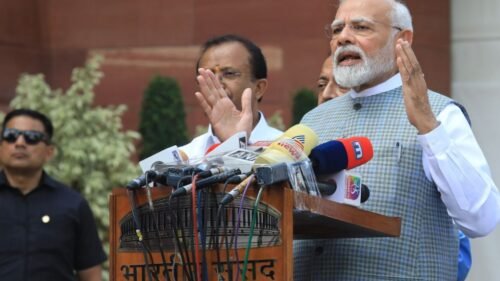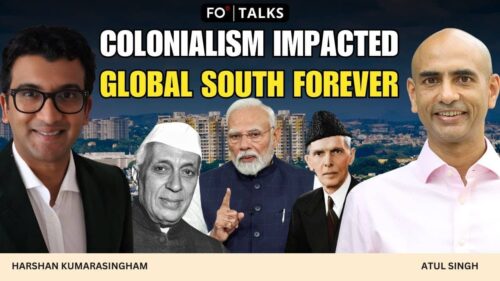In his address to the nation on the 79th festival of independence, Prime Minister (PM) Narendra Modi gave the longest speech ever by any PM. For 103 minutes, he promised to “stand shoulder to shoulder with his people” on the journey towards a $10 trillion economy by 2047 – Viksit Bharat (Developed India). He envisioned a developed India, built on the bedrock of self-reliance.
The Prime Minister’s attire conveyed symbolic political messaging. His saffron turban and saffron bandhgala jacket symbolized valor and courage. He also hailed the Rashtriya Swayamsevak Sangh (RSS) as “the biggest NGO,” highlighting his convictions about an organization that has dedicated itself to “vyakti nirman se rashtra nirman” (Nation-building through character-building of individuals). Modi reinforced this spirit of determination, declaring: “To build a developed India, we will neither stop nor bow down; we will keep working hard, and we will build a developed India before our eyes in 2047.”
Unity and security challenges
The speech began with a call for unity in the face of adversity. Modi named the calamities India has been facing, including the landslide and cloudburst at Dharali. He reminded the nation that the journey to independence was filled with obstacles: “The aspirations of newly independent India were taking flight, but the nation was still reeling with challenges.” Some of the challenges he addressed openly; others he left for interpretation.
From the ramparts of the Red Fort, Modi saluted the brave warriors of Operation Sindoor, delivering a message of resolve — a “new normal” in India’s policy towards Pakistan. This should be understood in light of statements made by Field Marshal Asim Munir, who threatened India with nuclear war during his visit to the US, and Bilawal Bhutto, who accused India of inflicting “great damage” on Pakistan over the suspended Indus Waters Treaty (IWT).
These words also affirmed Modi’s continued faith in India’s foreign policy and the External Affairs Minister Dr. Subrahmanyam Jaishankar, who was ambushed in Parliament by the opposition over his “dealings” with Pakistan and China.
On July 29, the leader of the opposition, Rahul Gandhi, accused the government of politicizing national security and imposing operational restrictions on the military during Operation Sindoor while addressing the Lok Sabha.
He argued that the army suffered losses because the government “tied their hands,” citing a presentation at a seminar in Jakarta on June 10 by India’s defense attaché to Indonesia, Captain Shiv Kumar, who stated that the IAF lost fighter jets because political leadership had constrained the military from targeting Pakistani establishments and air defenses.
The opposition’s criticism extended further. On May 19, Rahul Gandhi posted on X that: “EAM Jaishankar’s silence (on the number of aircraft we lost) isn’t just telling, it’s damning.” He called informing Pakistan “at the start of [their] operation” a crime. Senior Congress leader Jairam Ramesh added that the so-called “new normal” meant that India was being hyphenated with Pakistan. These comments signaled, in the opposition’s view, the failure of both Jaishankar and India’s foreign policy.
In response, Modi’s speech reinforced the government’s stance. He declared that India will never yield to nuclear blackmail and repeated Jaishankar’s Lok Sabha assertion that “blood and water cannot flow together.” He stressed that after the Pahalgam attack, the government has given the armed forces a free hand to respond to terrorists. “If our enemies continue the acts of terrorism in the future, we will act accordingly. We will give a fitting and crushing response,” he warned.
Self-reliance and sovereignty
Alongside foreign policy, Modi emphasized economic sovereignty. His speech was full of calls to end dependency. “Dependence on others raises questions about a nation’s independence,” he said. “It is unfortunate when dependence becomes a habit.” He argued that self-reliance is not merely about exports, imports or currency values but about national capabilities and the strength to stand independently. The PM lauded India’s achievements in defense, space, pharma and technology while urging indigenization and innovation: “Desh ka Bhagya badalna hai aapka sahyog chahiye.”
Agriculture and energy security formed another major focus. Modi praised the Green Revolution for making India a net exporter of food grains, but pointed out the risks of dependence on energy imports. “If India were not dependent on energy imports, the money saved could be used for the welfare of my farmers,” he said.
His appeal was not just to the farmers; it was a message to Washington. US President Donald Trump had slammed 50% tariffs on India after their trade deal collapsed due to disagreements over broader access to India’s vast farm and dairy sector and singularly targeted Indian oil purchases from Russia. He called India a “dead economy” in a post on Truth Social. After cutting a deal with Pakistan to develop its “abundant” oil reserves, Trump even suggested that “India could one day buy Pakistani oil.”
Modi rejected such rhetoric, asserting, “I have stood as a wall for the farmers and livestock keepers against any detrimental policy. Food security can’t be left vulnerable to imports.” He urged rationalizing fertilizer use, expanding domestic production and announced the launch of the National Deepwater Exploration Mission to harness offshore energy resources.
Progress in solar, nuclear, hydro and hydrogen energy marked a decisive step towards energy independence. On the dead economy rhetoric, he subtly answered, “The entire world is expressing confidence in the Indian economy. Amidst global instability, India’s fiscal discipline remains a ray of hope.”
Confronting China and building technology
China also loomed large in the PM’s address. He cited the July exodus of 300 Chinese engineers from Foxconn’s iPhone manufacturing facility in Tamil Nadu and Karnataka as an example of Beijing’s attempts to restrict India’s manufacturing growth. Dr. Shashi Tharoor, Chairperson of the Committee on External Affairs, has cautioned that China’s control over rare earth metals — including gallium and graphite — crucial for electric vehicles and the electronics sector in India, can limit India’s advanced manufacturing knowledge and keep the country dependent on Chinese supplies.
In response, Modi launched the National Critical Minerals Mission (NCMM) to explore 1,200 sites, ensuring strategic autonomy for India’s industrial and defense sectors. He also pledged that by the end of 2025, India will launch its own “Made in India” semiconductor chips, reflecting the nation’s growing strength in critical technology sectors.
Ultimately, Modi’s speech was not only an address to the nation but also a declaration to the world. “We will not allow even a single particle of slavery to remain in our lives, in our systems, in our rules, laws and traditions. We will not rest until we are free from all forms of slavery,” he proclaimed. His closing message was clear: India will not bow to a hegemonic world, and self-reliance will remain the foundation of its sovereignty.
[Kaitlyn Diana edited this piece.]
The views expressed in this article are the author’s own and do not necessarily reflect Fair Observer’s editorial policy.
Support Fair Observer
We rely on your support for our independence, diversity and quality.
For more than 10 years, Fair Observer has been free, fair and independent. No billionaire owns us, no advertisers control us. We are a reader-supported nonprofit. Unlike many other publications, we keep our content free for readers regardless of where they live or whether they can afford to pay. We have no paywalls and no ads.
In the post-truth era of fake news, echo chambers and filter bubbles, we publish a plurality of perspectives from around the world. Anyone can publish with us, but everyone goes through a rigorous editorial process. So, you get fact-checked, well-reasoned content instead of noise.
We publish 3,000+ voices from 90+ countries. We also conduct education and training programs
on subjects ranging from digital media and journalism to writing and critical thinking. This
doesn’t come cheap. Servers, editors, trainers and web developers cost
money.
Please consider supporting us on a regular basis as a recurring donor or a
sustaining member.
Will you support FO’s journalism?
We rely on your support for our independence, diversity and quality.








Commenting Guidelines
Please read our commenting guidelines before commenting.
1. Be Respectful: Please be polite to the author. Avoid hostility. The whole point of Fair Observer is openness to different perspectives from perspectives from around the world.
2. Comment Thoughtfully: Please be relevant and constructive. We do not allow personal attacks, disinformation or trolling. We will remove hate speech or incitement.
3. Contribute Usefully: Add something of value — a point of view, an argument, a personal experience or a relevant link if you are citing statistics and key facts.
Please agree to the guidelines before proceeding.